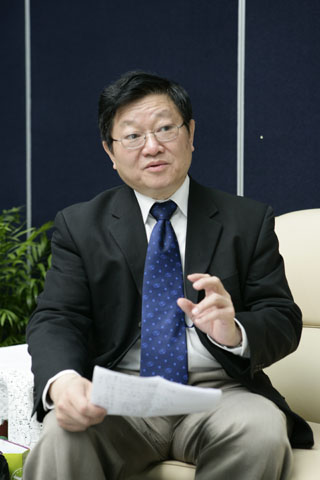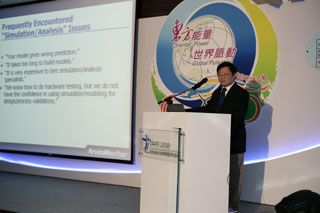Interview with ArvinMeritor's Senior Director Dr. Shih
2008/04/25 | By Steve ChuangTaiwan, with a mature industry of auto parts, has gradually exerted its influence in the global market, and recently attracted ArvinMeritor Inc., one of the world's top 100 suppliers of auto and heavy-duty vehicle parts on an OEM (original equipment manufacturing) basis, to seek cooperation with more local makers on the island.
For many auto parts makers in Taiwan, or even all around the Asia, ArvinMertior may no be so familiar to them as the U.S.-based large-sized supplier hadn't paid strong attention to the Asian Pacific market in the past, with only an estimated 7% annual revenue a year from the market presently, until the China car market's emergence and most recent recessions in the Europe and North American car markets.
In recent years, ArvinMeritor has started putting its heavy emphasis on operation deployment in the Asian Pacific market for auto parts, and worked with quite a few automakers and auto parts suppliers in China to build solid footholds, and has set up a joint venture with China's leading car brand Chery Automobile early this year.
Furthermore, ArvinMeritor has also continued to send its high-ranking managers to source auto parts from Taiwanese makers at Taipei International Auto Parts & Accessories Show (Taipei AMPA) for two consecutive years. This year, the firm dispatched a procurement manager and an Engineering-China Director of ArvinMeritor's China Technical Center, Shin Shan Ph.D., to buy suspension parts and auto electronics at the show.

In a one-on-one interview with CENS (China Economic News Service), Dr. Shin talked about ArvinMeritor, the firm's specific plans to tap the Asian Pacific market for auto parts in next few years and his optimism about a possibility of Taiwanese makers joining his company's supply chains in the future.
ArvinMeritor
At the moment, ArvinMeritor, with a history of nearly a century and combined revenue of US$7 billion a year, operates 62 manufacturing facilities, 30 technical centers and 9 warehouses, and employs more than 18,000 workers in 23 different countries of the world. The firm has two major business divisions, namely Light Vehicles and Commercial Vehicles, with the former contributing 33% to annual revenue a year and the former 67%, supplying a wide range of auto parts, including roofs, doors, electric motors, chassis system parts, suspension parts, braking parts, steering parts, drive axles, drivelines, hybrid drives and wheels.
Dr. Shih, with a career of many decades in ArvinMeritor, said that the company is an extremely experienced auto parts maker in the world, and boasts well-rounded systematic business management and organization culture in the company. "Under ArvinMeritor's systematic management measures, every daily affair in the organization is progressing in complete compliance with existing regulations and rules, in which any slopwork is not allowed to happen. I would say it (ArvinMeritor's systematic management) works just as a traffic light and all workers shall precisely obey each changing of that. By contrast, I found Chinese companies are more flexible in organization management; but this may be not good for them to seek cooperation with foreign investors."
Furthermore, in production, ArvinMeritor has carried out "lean production system," one of world's most efficient production management policies initially brought up by Japan's Toyota, by which automakers can reduce wastes and unnecessary work to create added value for customers as their ultimate goals.
According to Shih, ArvinMeritor keeps as the fewest workers as necessary in the company to effectively control its costs in labor, as labor costs in North America are prohibitive. Also, ArvinMeritor tends to build its production plants in remote areas far away from downtowns in the U.S for cheaper land costs.
Also, under leaning production system, ArvinMeritor encourages its workers to render their opinions for their work and any noticeable problems they faced in production and management every day before starting to work. "They are educated to make the company better. Such an effort on continuous improvement helps ArvinMeritor to subsist for near a century in intensifying competitions in the global market for auto parts," Shih said. "We are also planning to introduce the system into China."
On the other hand, Shih also mentioned that electric cars and hybrid vehicles have been no doubt gradually popular in America and Europe when concerns about eco protection are intensifying worldwide, adding that ArvinMerritor has moved to develop new parts, including hybrid motor controls and chassis system parts, for such cars and electric trucks and heavy-duty vehicles.
However, what facilitates the progress of developing those new parts is introduction of CAE (computer aided engineering), Shih's field, in ArvinMeritor. According to Shih, developed in line with growing demand for powerful, less expensive hardware and more sophisticated, easier-to-use software to design new cars and parts, CAE makes engineering analysis even more efficient and feasible than before in the sector.

In fact, CAE has been thought to enable analytical engineering and process manufacturing companies to vastly improve productivity, bringing their new products to market faster and cheaper. For example, complicated optimization studies, using computational fluid and solid mechanics techniques, enable product design integrity to be improved before costly investments are made in downstream operations.
Shih said that with more than 25 years of effort on applying CAE to optimization engineering, ArvinMeritor can effectively reduce R&D costs of new parts and enhance added value of them in performance and fuel economic. "However, success of CAE cannot depend on individuals in organizations but groups," he added. "It means every worker should be consistently engaged in the job as well as should learn importance of control costs." Undoubtedly, such a long-term focus on CAE has helped ArvinMeritor to consolidate its leading position in the market for heavy-duty vehicle parts and earn praises from its clients.
Moves to Explore Asian Pacific Market
Suffering declining sales in the European and American markets, ArvinMeritor has recently kicked off its business deployment in the Asian Pacific market and already allied quite a few Chinese automakers to hit the market.
Shih confessed that ArvinMeritor is a bit late in penetrating the China's auto market, compared with other leading companies in the car industry. "In the past, we had exported only low-end exhaust system parts to the Asian Pacific market and focused hardly in the market. As a result, only 7% of annual revenue generated from the market a year," Shih commented. Aiming to boost the portion to 33% in the future, ArvinMeritor has eagerly cooperated with local leading automakers, starting production of sunroofs, locks and car doors there, and planned to further set up production lines of advanced parts in Wuhu in China's central province of Anhui.
"At the initial stage of our plan, we have tried to build close ties with Chinese makers to quickly achieve localization objections. And then we are going to further introduce production of high-end parts and suitable products for use in either heavy-duty vehicles or light vehicles in the local market-they are our fields. In the future, we will spend a total of US$4 billion per year on sourcing auto parts in the Asian Pacific market, which already far excesses half of ArvinMeritor's existing annual revenue of US$7 billion worldwide a year," Shih responded.
Noteworthy was that recently ArvinMeritor has set up a joint venture, ArvinMeritor Chassis Systems Wuhu Co., with China's Chery Automobile as the most important part of its business expansion plan in China. The new joint venture, seen as the headline in China's car industry, is scheduled to be operational in 2008 and will turn out chassis system parts and attain capacity approximately valued at US$150 million a year in 2010.
"In fact, we are still learning how to operate in China, and, above all, trying to build own resources there because in recent years we are still sending back finished parts made in China to testing labs we trust in North America; this is costly and somehow wired," Shih pointed out. "Thus, seeking resources in China is quite eager for us."
Count Taiwan In
On the other hand, Shih is heavily promoting Taiwan and convincing ArvinMeritor's upper management to outsource more auto parts from the island. "I must say ArvinMeritor had almost no ideas about Taiwan before. Such a situation might be a result of insufficient promotion of Taiwan-made auto parts; however, this can be improved by collective efforts in the sector, such as Taipei AMPA," he mentioned.
With two consecutive years of dispatching its high-ranking managers to Taipei AMPA, ArvinMeritor has gradually impressed by Taiwanese auto parts makers' excellence in production and credibility, according to Shih. "I am optimistic that Taiwanese makers are quite capable to join ArvinMeritor's supply chains as they are good at production and development of high-end, advanced auto parts. To make a big progress in exploring the Asian Pacific market, ArvinMeritor can't neglect Taiwan's strong influence in the sector. No doubt, ArvinMeritor and Taiwan will heavily depend on each others in the future."
Shih also answered a question of how Taiwanese makers to become suppliers for ArvinMeritor, saying "In addition to common standards, like ISO, Taiwanese makers must pass a series of strict supplier certifications in production and operation management from both ArvinMeritor and, in particular, ArvinMeritor's downstream customers. This, I think, is not difficult for them to get certificated." At present, there are five to six Taiwanese auto parts makers on ArvinMeritor's supplier list, including Hota Industrial Mfg. Co., Ltd. and Kai Fa Industry Co., Ltd., which respectively supplies gears and front dampers to the firm.
When talking about the future of Taiwan's auto parts sector, Shih commented that Taiwan should put more emphasis on development of high-end auto parts to avoid being trapped in a myth of rock-bottom prices. Plus, he also pointed to Taiwan's superior competitiveness in know-how of auto parts, saying "I suggest that Taiwan could try to concentrate on development of IT (information technology) and CAE as technical supports for world's car industry."
"It is also highly recommendable for Taiwan to work on quality and standard testing," he added. "I think Taiwan's government-funded ARTC (Automotive Research & Testing Center) is a living example that countries in Asian Pacific area can do the job as excellent as America and Europe. If Taiwan becomes Asia's testing center of auto parts, the island will be more influential in the world and can easily create more win-win opportunities with more international leading companies."




